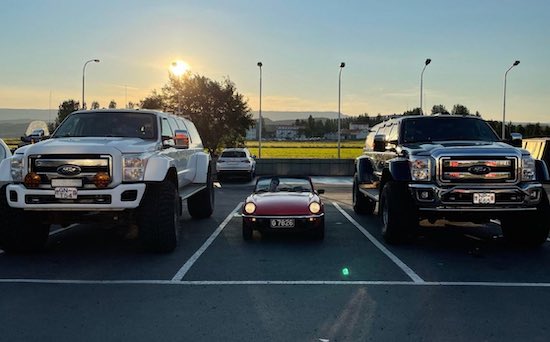
I am asking each of us to be more aware of the impact on the planet of those choices.
The image above is of a mid-1960s Triumph Spitfire, a lovely British convertible with plenty of room for two people. I know, as in 1985, aged 20, I had a 1965 model the same age as me. Hey, we were students, we sometimes even squeeze a third in the tiny seat behind the driver and passenger.
Now, as to the trucks on either side, the image is shocking. Nobody needs a behemoth like that, just as no suburban parents need an oversized German or Swedish SUV weighing over 2 tonnes for the school run. Let me go further, some of those parents even virtue signal by buying hybrid SUVs, whereas a small amount of research shows that these are the worst of all worlds, carrying the CO2 cost of extracting rare metals and making them into batteries, then adding to the already huge weight of those SUVs.
In 2022, I am not asking anybody to make changes to their choices on what they buy and use, I am starting a little more gently. I am asking each of us to be more aware of the impact on the planet of those choices.
To begin, bigger is not necessarily better and is often far worse. A few thoughts on this:
- Recently I saw a Cayman real estate listing proudly trumpeting the “LEED Silver” eco-credentials of a private residence. However, no matter how well insulated and how efficient the air conditioning system is, the house was still 15,000 square feet. Jsut as nobody needs a behemoth vehicle, nobody needs a 15,000sf house, particularly on an island where almost all electricity is still generated from heavy fuel oil.
- About a year ago I bought a house. The bathroom looked lovely, but during the year I realised that the previous owners had bought nice looking fixtures but had bought very low cost ones. The missing part in the equation is the ability to repair. First the shower started a dripping leak, but as one could not replace the £1 washer, the entire unit had to be replaced. More recently, the light in the lit mirror failed. I thought I could replace the bulb, but no, I have to throw away the whole unit and buy a new one. From research, the original cost of the shower unit was about £200, the mirror about £100. I could now replace them with units built to last (and with replacement washers and bulbs costing tiny amounts), but the way the market has gone, such high quality fixtures cost at least 3x more. Reader, I apologise, I replaced them with yet “built to be disposable” items, but I was at least aware of the choice.
- Fast fashion. Gone are the days when fashion came in a maximum of four seasons, instead we see “drops” of new stock coming with ultra-fast supply chains from around the world in weeks. Taking this even further is Shein, who take the “must have it” desire of social media viewers and produce thousands of units and get them to customers in days. Now fast fashion does not have to mean low quality, but increasingly it does, added to which the amount of packaging for online clothing, plus the frequency of buyers returning goods, all of this lends to a toxic combination for the planet of a) cheap and disposable clothing, and b) massive transportation and packaging costs. Awareness here is of what we are buying when we buy clothing. I’ve recently got to know a little bit more about vintage clothing. Often really high quality at great prices, plus you know you are not adding to carbon impact as you are buying used clothing.
I could go on but today simply felt to highlight a few examples that sprung to mind.
I will continue to seek to be more aware of my impact on the planet and then look to make choices to reduce it. You? (and would love your thoughts and ideas!)
